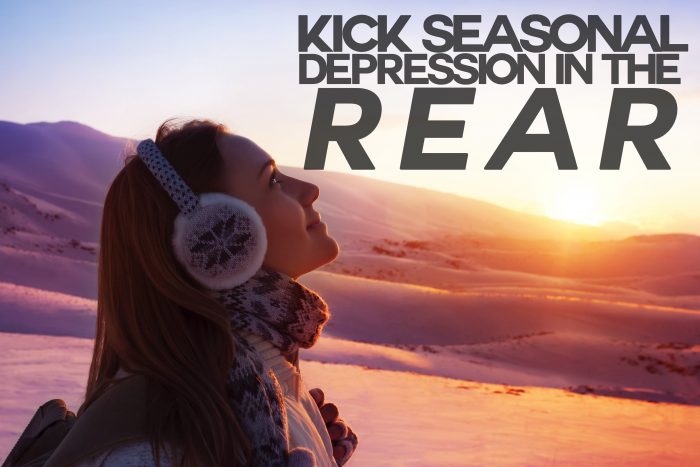
Ways to Kick Seasonal Depression in the Rear
To paint a picture of winter, the view is bare trees, gray skies, and snowy landscapes. Although it’s not quite winter yet, you can imagine the frigid temperatures and experience the gloomy feelings the image gives off. Everything is usually quieter, darker, and still in the winter.
For some people, the dark clouds that come around in the winter, follow them around over their shoulder for the whole season. It’s like a barrier between you and the metaphorical sunlight that is happiness. This is called “seasonal depression,” or Seasonal Affective Disorder. Basically, what this means is that the symptoms of the disorder come around at the same time each year. Although most commonly, this occurs in the winter, it can happen for some people during the spring and summer as well.
One theory regarding the cause of winter seasonal depression says it is possible that less sunlight leads to a decrease of Serotonin in the brain. Serotonin is a chemical in our brains that affect our moods, typically bringing about feelings of euphoria when released. Vitamin D in natural sunlight increases your brain’s ability to produce Serotonin, which helps fight depression symptoms. The lack thereof has the opposite effect.
Seasonal depression can put a damper on our lives for a couple of months. This winter, let’s put forth the effort to fight the symptoms and remain as content as possible. Symptoms include: fatigue, loss of appetite or greater appetite, weight loss/gain, desire to be alone, need for sleep, difficulty concentrating. If you notice any of these symptoms at the same time each year, here are some tips on dealing with seasonal depression.
- Take Vitamin D supplements. Studies have shown that taking Vitamin D supplements can improve memory, boost your mood, and supports cognitive functions. Learn more about the benefits of taking a supplement here.
- Surf the web for a light that provides therapy for this disorder. These lights are designed to give off artificial UV rays that provide similar comfort to that of the sun. Keep one at your desk in the office. The research will help you pick the safest light therapy lamp.
- Aromatherapy. Using aromatherapy is scientifically proven to produce specific chemicals in your brain to help you feel certain ways, depending on the oils you are using. Read more about using essential oils here. Use caution to ensure you do not have any allergies or sensitivities to any of these oils.
- Exercise. Don’t even try to kid yourself–you will feel much better after moving around. Don’t put off exercising just because it’s cold. It will make you feel good and boost your endorphins. Find ways to exercise in the cold, like doing smaller workouts from your living room, attending a yoga class, or purchasing a gym membership if you don’t already have one.
- Use uplifting mood herbal supplements. Speaking from personal experience, mood support supplements are HIGHLY beneficial to those who suffer from mental illness. Although there are dozens of them, a few suggestions are John’s Wort, Valerian Root, and L-Theanine. You can typically find them at your local supercenter or pharmacy. Check with your physician before use.
- Take advantage of the sunlight during the day. If you work during the day, take walks on your lunch break on sunny days. Appreciate the sunlight and think about all the positive things it’s doing for you–physically and emotionally.
- Journal. Writing about your feelings can take that weight off of your shoulders. Recurring negative thoughts will bring you down, and writing it out can release those emotions in a private way.
- Positive thoughts/affirmations. Never underestimate the amazing power of positivity. Combat every negative thought with the opposite–e., Replace “I am feeling sad” with “I have a grateful heart for all of the wonderful things I have in my life.” Train your mind to think a positive thought every morning as soon as you wake up. “Today is going to be a great day,” with these thoughts, you can make it a great day no matter what happens. See how your life changes by a simple shift in your perspective.
- Be with those you love. The happiness that comes from sharing a love for one another is unlike any other. Try to make plans with your friends and family as often as possible to indulge in the simple pleasure of love.
- Talk to your doctor. If you have put effort into relieving yourself of the symptoms and nothing is working, talk to your doctor. They can run tests on your body to see if you have hormone unbalances and will be knowledgeable about which specific steps you need to take.
Remember this winter: You have to want to feel better. That’s the only way to have the desire to put effort into a more conscious, content lifestyle. You are not alone in the way you feel.










